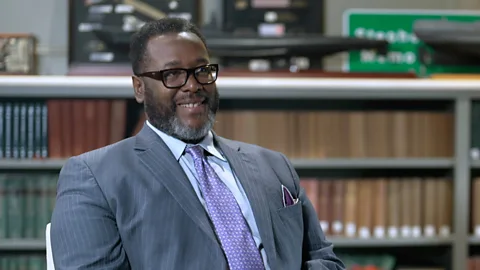Wendell Pierce on black resilience in America

US Special Correspondent Katty Kay launches Influential, her new episodic programme, with an intimate conversation with American actor Wendell Pierce.
An expert storyteller, actor Wendell Pierce uses language to infuse emotion, insight and even levity into the most sensitive subjects. At New Orleans' National WWII Museum, Pierce s journalist and author Katty Kay on the premiere of her unscripted new series.
Pierce, the renowned, Juilliard School-educated actor, shot to popularity for his on-screen roles in The Wire and Suits, and on-stage in Death of a Salesman. Alongside sharing the secrets behind the emotive acting style that's earned him a slew of creative accolades, Pierce also shares a unique lesson about race and resilience in America.
Where to find Influential with Katty Kay
'Don't let anyone else tell you that your pursuit of liberty is wrong'
Kay and Pierce walk through the museum, decorated with medallions and war planes, to explore Pierce's relationship with his father, a World War Two veteran.
Pierce's father was drafted into the war aged 17. In Saipan, he received several medals of honour – yet the white woman who worked on his discharge didn't believe a young black man could earn them. He walked away undecorated. It wasn't until 2010 that his family received a letter, dated January 1945, confirming the honours. With the help of his State Senator, and the National WWII Museum, Pierce's father finally received his medals – even a ceremony among his family to present them.
Pierce's father could have been resentful for the delay, points out Kay – but Pierce said not only was he not, but he also emerged stronger.
"You fight your way, I fought my way. We're all going to get there some kind of way," Pierce says in his father's voice. "And that's what he taught me: that there's a dexterity to the to the conceit of what America is. And don't let anyone else tell you that your pursuit of liberty is wrong."
Kay also discusses with Pierce the legacy of his once-segregated New Orleans hometown, and the people who made it special – including his father.
When Hurricane Katrina hit New Orleans, the storm decimated Pierce's entire block – alongside, he says, the community that lived in it. It'd been devastating – but Pierce's personal history moved him to make a difference.
"Because of the Civil Rights movement, this neighbourhood was created. My parents, like the Moses generation, had created the sanctuary," he says. "And I knew I had responsibility as this part of their Joshua generation to rebuild it. And so, I put together an effort of residents and we rebuilt our neighbourhood, brick by brick, house by house, block by block, until we returned. And now we are on the of Historic Places on the National of Historic Places: Pontchartrain Park."
Much of Pierce's relationship with succeeding as a black man in the US – and owning his experiences – comes back to his father's legacy. "You know that he's one of those true patriots," says Pierce. "He loved his country, when his country didn't love him back."
'You have to create that world in your heart'
Kay also reaches to reveal the humanity behind Pierce's acting, which has enabled him to connect with audiences on a deep level, production after production. Speaking about researching his character Detective Bunk Moreland in The Wire – based on a real life, retired detective in Baltimore – Pierce says police officers are "students of human nature, like actors".
"How are you studying human nature every day to bring what you observe in people into your roles">window._taboola = window._taboola || []; _taboola.push({ mode: 'alternating-thumbnails-a', container: 'taboola-below-article', placement: 'Below Article', target_type: 'mix' });
